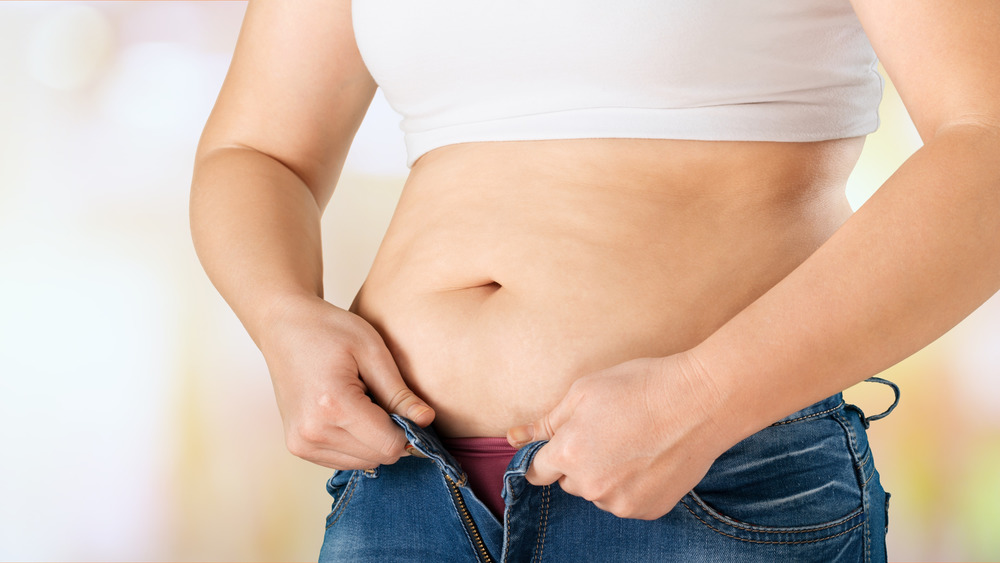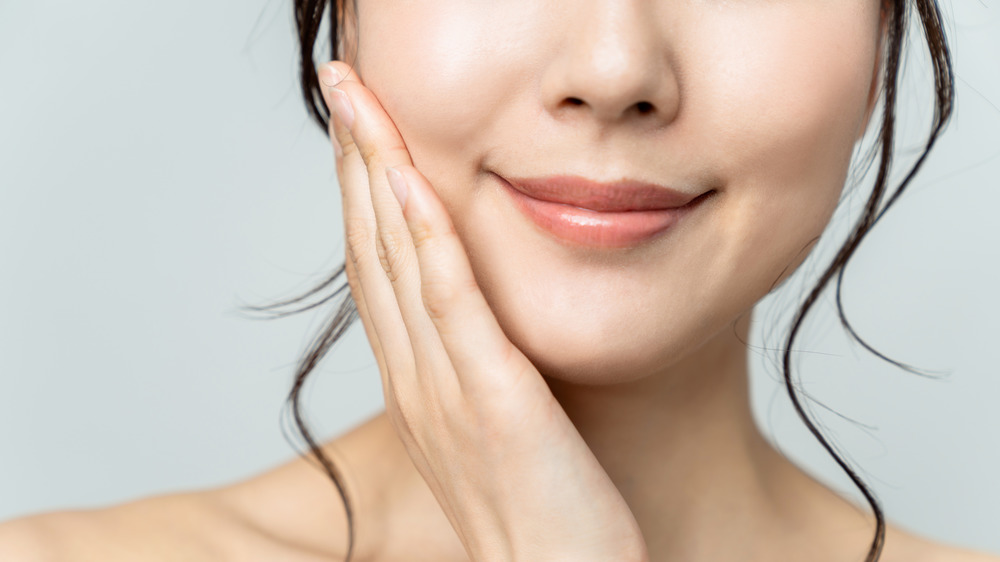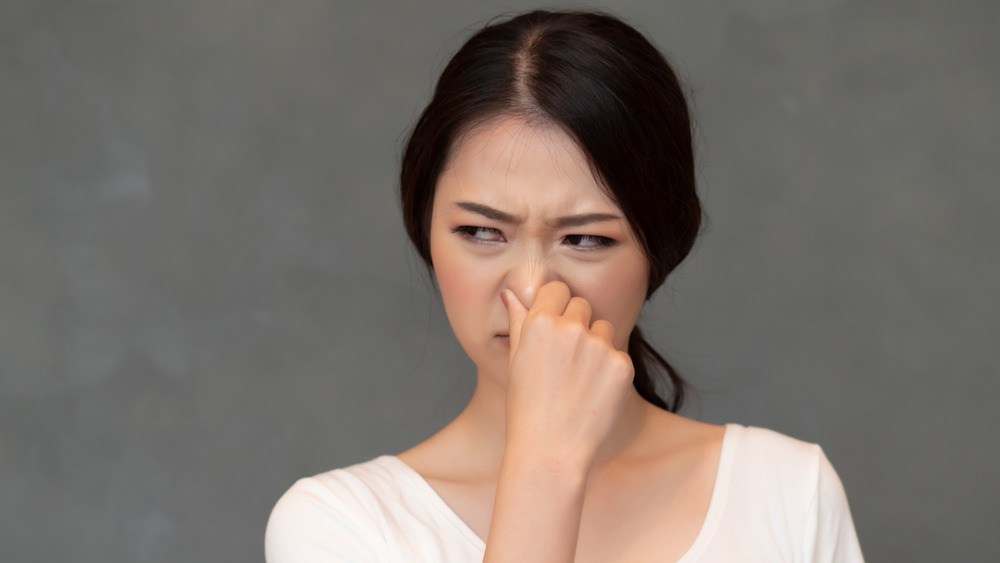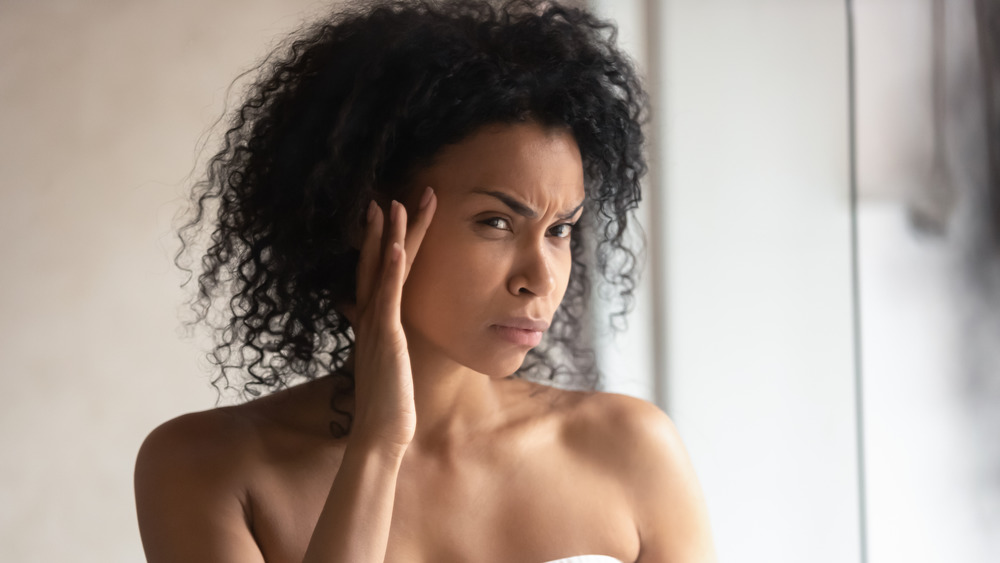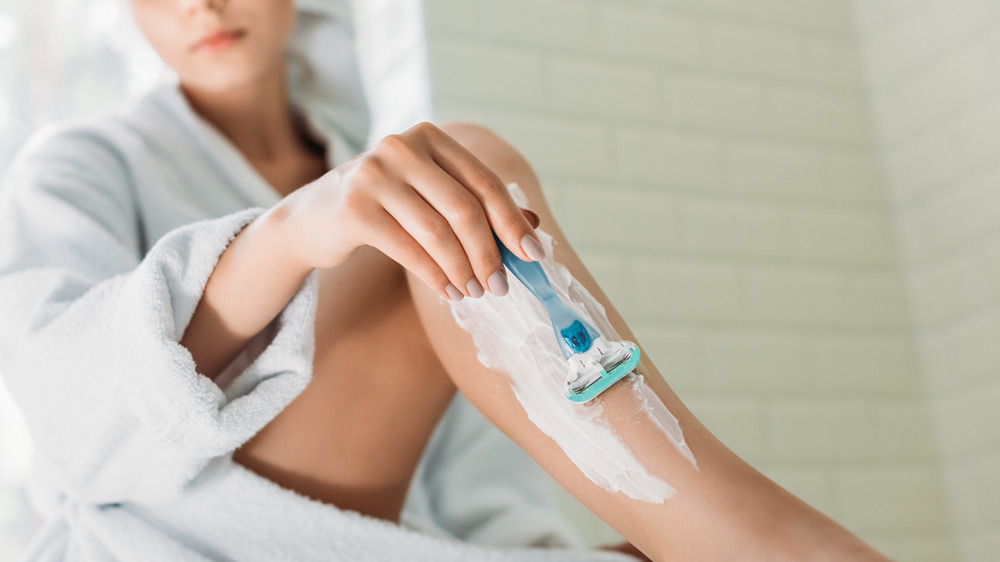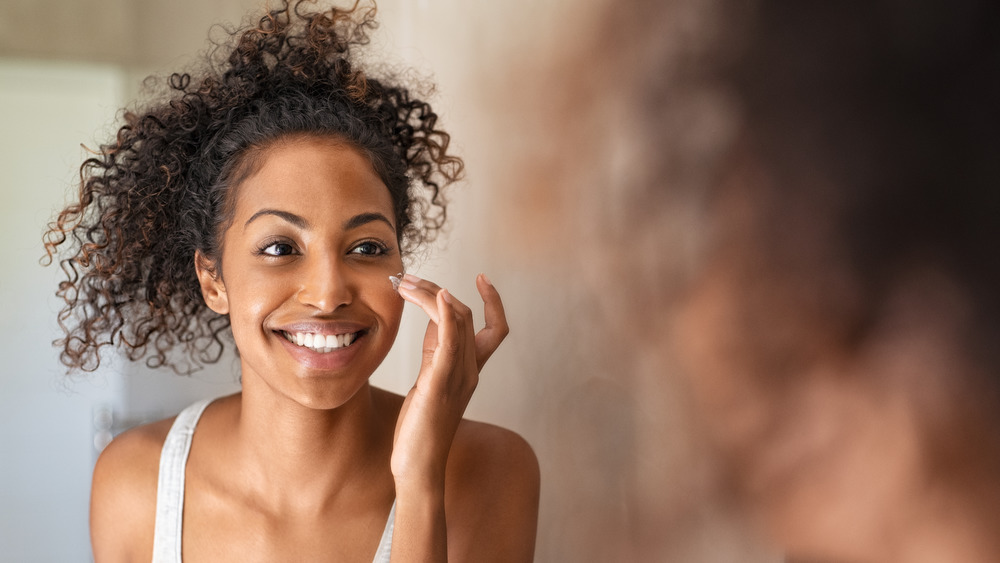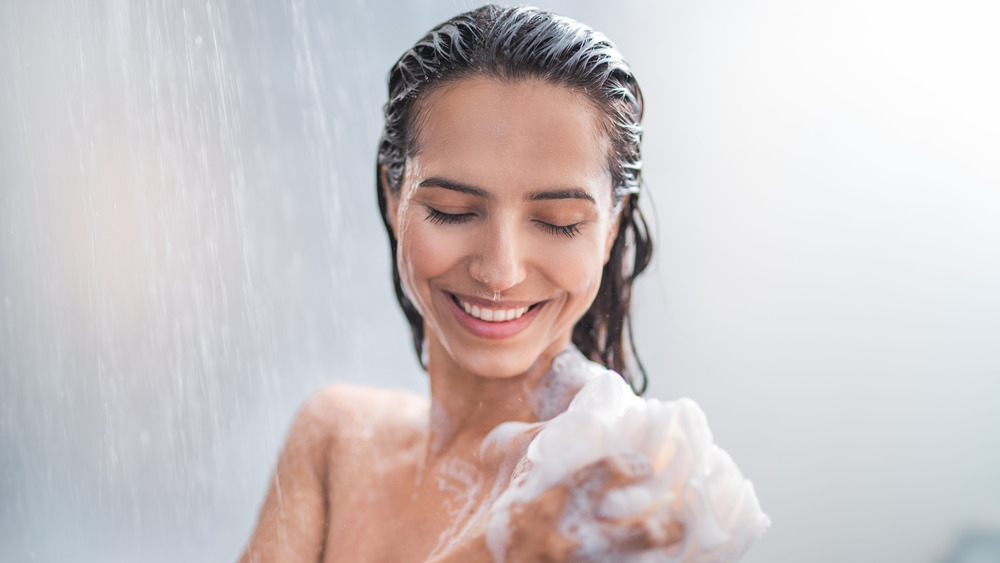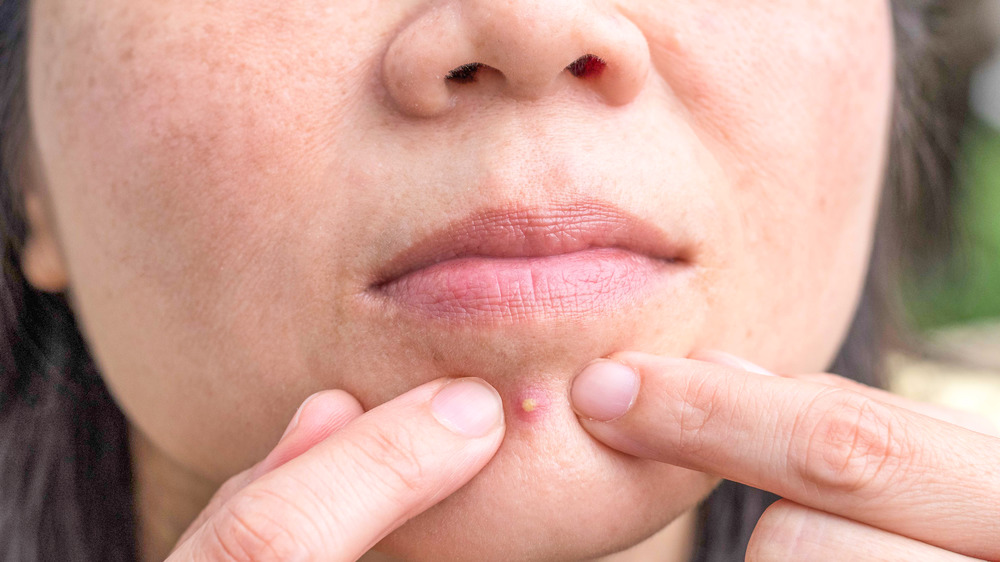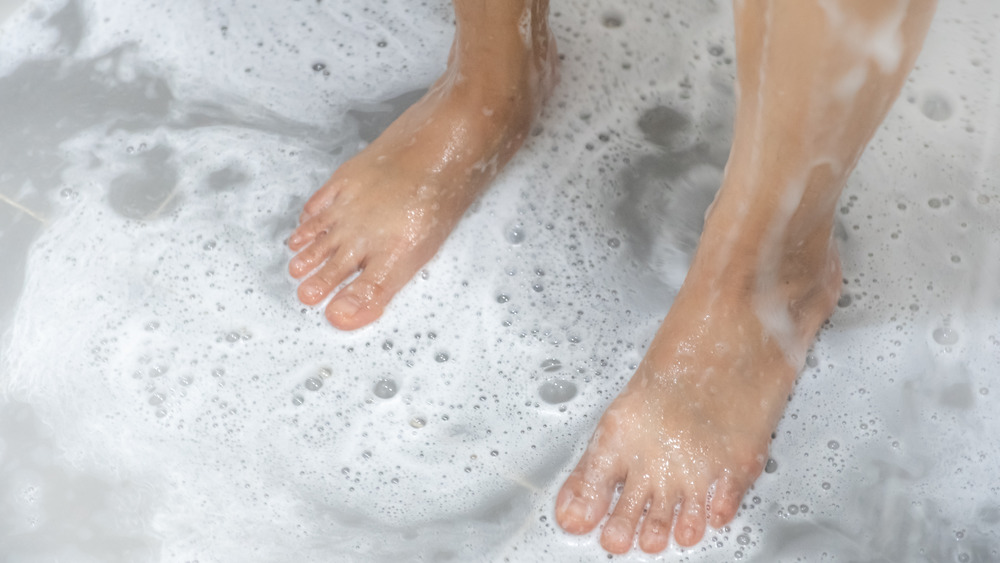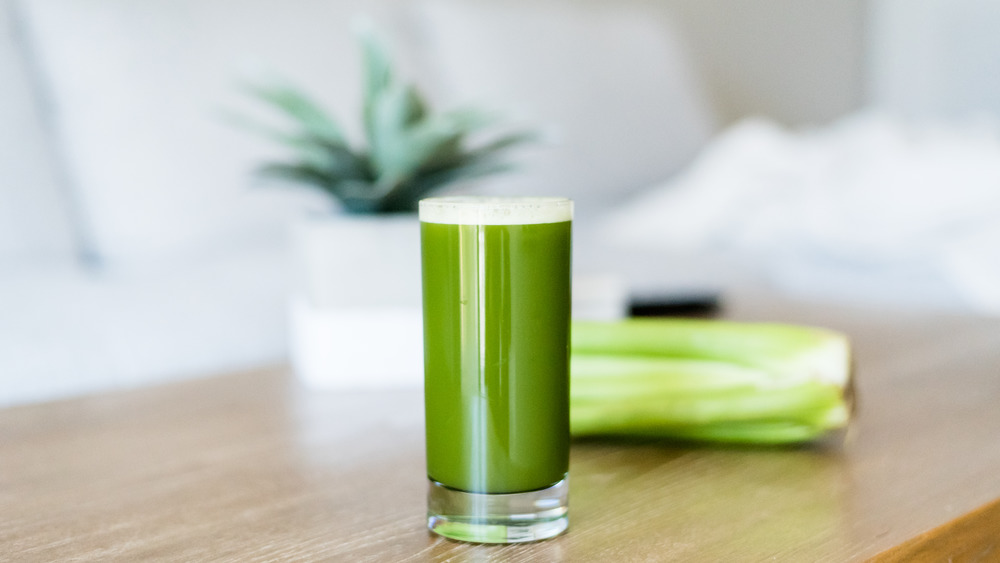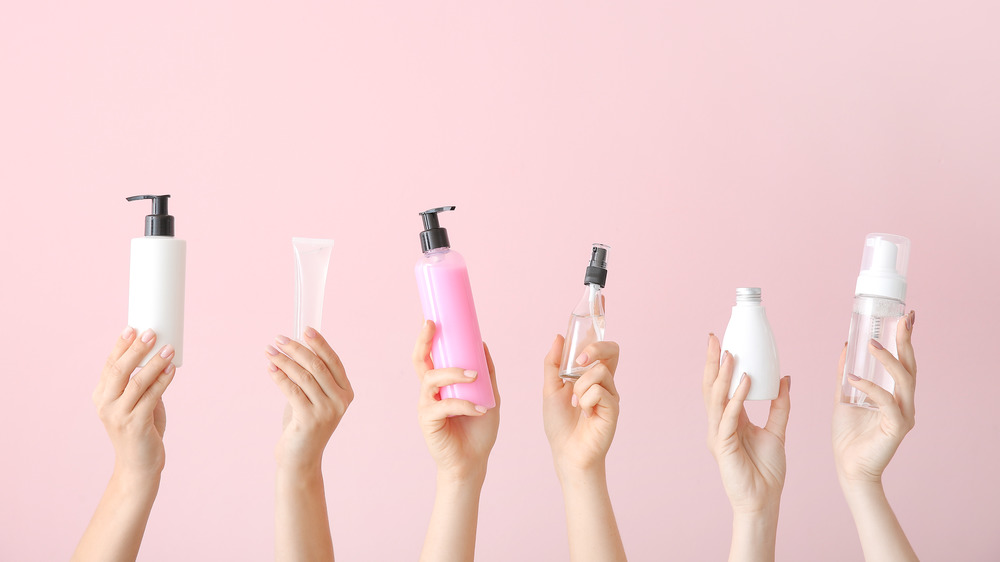What Every Woman Secretly Does To Their Body But Would Never Admit
All women do certain things to their bodies that, while totally normal, they wouldn't cop to in public. For instance, there are things women do every day in their own bathrooms but would never dream of doing in a public locker room. And even if you know other women do the same things, you may go on pretending that you don't. Well, it's time we ladies all started admitting that there's nothing weird or embarrassing about any of the things we do in secret. If every woman does them, we should all just talk about them openly, right?
Are you curious to know what these "things" are? Check out what experts and other women have to say about common, secretive habits — from plucking certain hairs to how often we really shower. We bet you'll feel better about all of it once you realize that every woman you know is carrying around the very same secrets.
Women don't wash their hair as often as you might think
It feels great to have freshly washed hair, but most women don't do it every day. According to a 2017 survey, only 19 percent of women washed their hair with shampoo ever day, while 63 percent used shampoo multiple times a week. As for the rest, they shampooed even less often.
Luckily, brands have caught wind of this open secret, and there are now hundreds of dry shampoos available on the market that absorb grease and make your hair look freshly washed — yes. even when it isn't. And fear not: Skipping a regular shampoo session is actually good for you. You see, the skin on your head is covered with billions of good bacteria, known as your microbiome, which helps protect your skin from bad bacteria and other harmful things.
Dominic Burg, chief scientist at Évolis Professional and a hair biologist, told Byrdie, "Too frequent washing of the scalp with harsh cleansers can upset that microbiome, and an imbalance in the microbiome can lead to scalp problems." According to Burg, you should only wash your hair two or three times per week.
Women pick their noses
You likely d not pick your nose in public but, as turns out, nearly everyone does dig for gold in private. According to a 2001 survey published in the Journal of Clinical Psychiatry, virtually all adolescent participants reported picking their nose at least sometimes. A similar study in the Journal of Clinical Psychiatry found that pretty much all adults — 91 percent of us, to be exact — do it, too. Sheesh!
Most of the time, nose picking doesn't pose any threat to our health (although it's still totally gross, so don't do it in public). However, a 2018 case study published in Cureus found that compulsive nose picking was associated with inflammation of the nasal tissue, which over time can narrow your nostril openings and make it more difficult to breathe.
Another study found that nose pickers are "significantly more likely" to have the bacteria Staphylococcus aureus in their nose, which can potentially lead to a serious infection or sores inside your nose. Bottom line: If you pick your nose on occasion, it's no big deal. But if you do it constantly, that's a habit you should probably look to break.
Women squeeze their bodies into clothes that don't fit
It probably comes as no surprise to you that most women are guilty of keeping too-small clothes in their closet. Most of us feel so much pressure to be a certain size and thus feel so much guilt if we get bigger. As such, keeping our outgrown clothes around or purchasing clothes in our former size seems like a natural response. Indeed, according to Marie Claire, 72 percent of women actually buy clothes that are too small on purpose.
Ladies, we're here to tell you that it's time to stop this. Dr. Rachna Pande, an internal medicine specialist, wrote in The New Times that wearing clothes that are too tight is actually bad for your health! "Very tight jeans can compress the nerves of the thighs causing pain, tingling and numbness in the thighs and or legs," she wrote. Uh, yikes.
A too-tight waistband can put pressure on your abdomen and force stomach acid upwards, leading to heartburn. Too-tight pants can also restrict circulation to your heart, or cause muscle pain due to lack of blood in your muscles. According to Pande, super tight clothes can even negatively impact your fertility. The answer is clear: Stop wearing clothes that are too small and instead shop for clothes that give you room to breathe.
Women pluck stray facial hairs
Does anyone else have that one annoying chin hair that just keeps growing back? You know, the one that's so coarse you can just feel when it's coming in, and it tortures you all day long until you can get to a pair of tweezers? Turns out, yes.
According to a 2006 randomized controlled trial published in the Journal of Psychosomatic Research, women spend a considerable amount of time worrying about and managing facial hair. Most women felt anxiety about facial hair, too.
That's a bummer, especially considering chin hairs are actually very common for women. Dermatologist Arash Akhavan told Well+Good, "It's not uncommon for women in their mid to upper 20s to begin noticing stray hairs on their face." These hairs continue to appear as we age, due to hormonal changes. And while laser hair removal might seem like a way to permanently get rid of these hairs, it actually isn't. Because of these ongoing hormonal changes, new hairs will always be popping up, Akhavan said. Instead of freaking out, know that it's totally normal to sprout such hairs.
Women deal with period farts
As if getting a period wasn't enough of a pain in and of itself, most women also have to deal with extra gas during that time of the month. A 2014 survey study of 156 women in BMC Women's Health found that 73 percent experienced at least one significant gastrointestinal symptom either immediately before or during their period, including flatulence, diarrhea, and cramping.
Why does this happen? Well, hormones. Estrogen and progesterone, two hormones that are heightened during your period, affect your small intestine by creating extra gas, constipation, and diarrhea. If you're constipated, poop literally sits in your intestines for longer, which makes that gas smell even worse (via Healthline).
So, what can you do about it? There's no way to eliminate these so-called "period farts" completely, but there are a few ways to make them smell a little less pungent, according to Healthline. Avoid large binges, and instead eat small meals to prevent overloading your digestive system, taking your time to savor each bite. During your period, you can also cut back on foods that cause excessive gas, like beans, cabbage, and broccoli. If you're up for it, regular exercise also helps keep things moving.
Men aren't the only ones who engage in self-pleasure
Many men are generally open, and crack jokes, about their masturbation habits while most women keep quiet about their self-pleasure habits. That's silly, because a comprehensive study conducted in 2018 found that 76 percent of American women masturbate.
Honestly, masturbation is nothing to be ashamed of and it's actually great for your mental health. Clinical social worker Kelley Kitely told Self that the focus required to have an orgasm actually helps lower stress by taking your mind off of other things that may be bothering you. The orgasm then releases endorphins, which also help to blunt stress.
"I really believe firmly in [masturbation] building confidence and self-esteem for women and knowing their own bodies and what they like," Kitely told Self. So if you're worried that it's indulgent or somehow unladylike, it's time to rethink that. Self-pleasure can actually help make you happier, healthier, and more confident in your own skin.
Women consider changing their bodies
Eighty percent of women the U.S. are dissatisfied with the way they look (via PsychCentral). This is obviously a huge shame, but why is it the case? According to Carolyn Ross, a physician who works with eating disorders, the way media portrays bodies has a lot to do with it. "In the 1900s, the American public became more consumed with the thin, boyish physique, viewing full-figured women as indulgent and lacking in self-control — a trend that grew exponentially by the end of the century," she wrote for PsychCentral.
This has caused many women to want to change their bodies. One U.K. study found 19 out of 20 young women desire to change the way their bodies look, with 50 percent of women between the ages of 16 and 21 even considering plastic surgery (via The Independent).
What can you do to move away from body dissatisfaction? Ross says that awareness is key. Knowing that the body ideals portrayed in the media are unrealistic could help you detach from them and start to accept your body for the beautiful thing that it is. And, if thoughts of body dissatisfaction are persistent, consider seeing a therapist.
Women go days without shaving
Think you're the only woman out there who lets her leg hair get stubbly pretty much every week? Think again. According to a poll on Cleveland.com, only about 13 percent of women shave every day while nearly 25 percent shave every other day and a whopping 46 percent shave just once a week. An additional 12 percent of women reported not shaving or waxing at all, which is another totally valid option that many women don't consider.
The truth is: There's nothing wrong with letting your leg hair grow out a little. Most men don't shave their legs or armpits at all, remember? If it's wintertime and your legs are covered all day long, why waste extra money on all those razor blades and cans of shaving cream? And, if it's summertime and your legs are on full display, don't worry about a little bit of stubble.
According to the poll, the majority of women let their legs get a little stubbly on the regular. If you hate hair on your legs but also don't like to shave, you could consider waxing, which keeps hair away for longer, or laser hair removal, which can remove hair semi-permanently.
Women apply many products to their skin
If you think your medicine cabinet is overstuffed with beauty products, get this: The average woman uses a whopping 16 beauty products per day, according to research cited by The Telegraph. Of course, not all of those products are part of a skincare routine. Still, though, it's fair to say that a lot of women have multistep skincare routines.
That's not necessarily a bad thing. However, your routine doesn't have to be complicated. Dermatologist Ashley Magovern told Good Housekeeping that your routine should follow three basic steps: Cleanse, treat, and moisturize.
She recommended cleansing with a gentle face wash since a too-harsh cleanser will actually break down your skin barrier. To "treat" your skin, you'll want to first use a toner to balance your skin's pH. Then, add a vitamin C serum to reverse damage. Next, gently dab eye cream underneath your eyes and moisturize the rest of your face. Magovern recommends a light moisturizer for daytime that will sit under makeup, and a more intense moisturizer at night. Finally, you'll want to spray or rub on sunscreen to keep your skin protected and prevent premature aging.
Women don't shower every day
After a hard workout or a long day in the sun, nothing feels better than a nice hot shower. Yet there some days when we women don't work out or otherwise get sweaty. And on those days, a shower doesn't seem necessary. In fact, a 2015 survey revealed that 80 percent of women don't shower every day, and a whopping 30 percent regularly go three days without showering (via Daily Mail). So, it's normal — but is it healthy?
According to Harvard Health Blog, there might actually be some benefit to not showering every single day. Washing yourself daily, particularly with hot water, can lead to dry, itchy skin, and can remove good bacteria that helps protect the skin and immune system from potentially harmful bacteria. While there's no agreed upon "ideal" frequency for showering, most experts agree that showering several times a week is perfectly fine.
Of course, if you exercise or get sweaty for another reason, you probably need to shower more often to prevent body odor. If you do shower every day, you may want to consider making every other shower short, focusing only on soaping up your "armpits and groin."
Women pop their own pimples
If the success of Dr. Pimple Popper tells us anything about ourselves, it's that we love to watch a good pimple get popped. And actually, there's a scientific reason why most people love not only watching pimples get popped, but popping their own. Sanam Hafeez, a clinical psychologist, told Vice that popping and picking pimples actually makes our brain produce dopamine, a neurochemical that makes us feel good. "Seeing the pus, blood, or liquid come from a popped pimple makes the person feel accomplished, like 'I got it,'" Hafeez said. Weird, right?
Truthfully, it's not great to pop your own pimples. According to WebMD, popping a pimple can actually spread gunk around your skin and lead to more pimples. Or worse, it can force bacteria deeper into your skin, leading to infection or even permanent scarring. While we know that pimple popping is hard to resist, you're better off just leaving that zit alone and letting it go away on its own, which typically takes between three and seven days. An improperly popped pimple, on the other hand, can actually take weeks to heal.
Women pee in the shower
You'd never pee in the shower with your partner, but let's face it, you probably don't think twice when you're in there alone. That might seem a little weird, but it's certainly not abnormal. According to an Angie's List survey, 80 percent of people pee in the shower (via Shape). To be honest, we would've thought it was even more common than that!
Turns out, peeing in the shower is absolutely fine. Philip Werthman, a urologist, told Shape that while our pee contains bacteria, it doesn't contain any more of it than the other fluids, like sweat, that get washed off during a typical shower. Besides, it's not like you're bathing in your own urine. Peeing in the shower means that the pee rinses right off and down into the drain. That is, as long as you're doing it before you soap up and not right as you're getting out of the shower.
While we wouldn't recommend that you start doing this in public locker rooms or in front of a shower partner, there's no need to be embarrassed if you skip the toilet on your way to the shower and pee right down the drain.
Women fall for fad diets
While I'm sure we all wish that this wasn't the case, the truth is that pretty much all women have fallen for a restrictive diet at one point or another. According to a report by Monte Nido Eating Disorder Center, 91 percent of women attempt a diet by the time they're in college. What's worse, 22 percent of college-age women say that they diet often or always.
This sucks for obvious reasons. Restrictive diets aren't fun, and they often leave us feeling frustrated and hungry. Unfortunately, they also have health consequences. According to WebMD, fad diets or crash diets don't actually lead to long-term weight loss. Instead, they often lead to very quick weight loss, followed by very quick weight gain when your body decides it's had enough of such extreme deprivation.
So, what can you do instead of constantly falling for fad diets? Learn how to suss them out, then avoid them. Anything that promises rapid weight loss, doesn't seem sustainable long-term, or requires you to drastically cut back on foods or entire food groups is probably a fad diet.
Women use vaginal cleansers and creams
Look, we all want to be naturally fresh down there, but sometimes our nether regions need a little help staying clean and healthy. According to a 2018 cross-sectional study published in BMC Women's Health, 95 percent of women have used at least one product in or around their vaginal area, the most common being vaginal moisturizers, anti-itch creams, feminine wipes, washes, sprays, and powders. In other words, it's totally normal to apply products to your vagina.
Another thing to take comfort in is that 80 percent of women reported having at least one adverse vaginal symptom in their lifetime, like a sexually transmitted infection, yeast infection, itching, odor, or another issue. Don't be ashamed if you're experiencing any of these symptoms. Some over-the-counter products (though not all) can be helpful. You can also go to your OB-GYN and explain what's happening so that she or he can help you figure out what's going on and prescribe a treatment or a hygiene routine to help get things back to normal.




